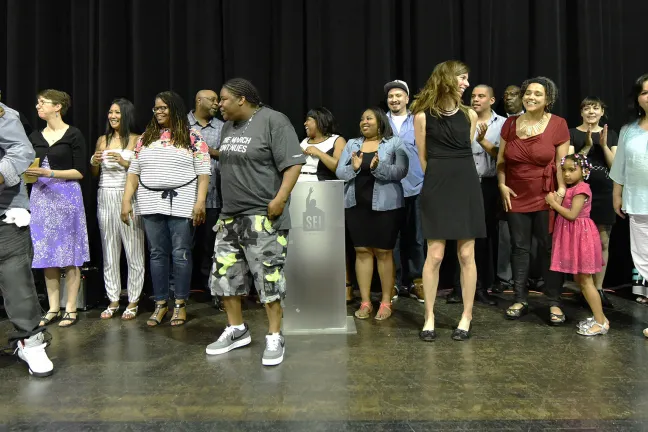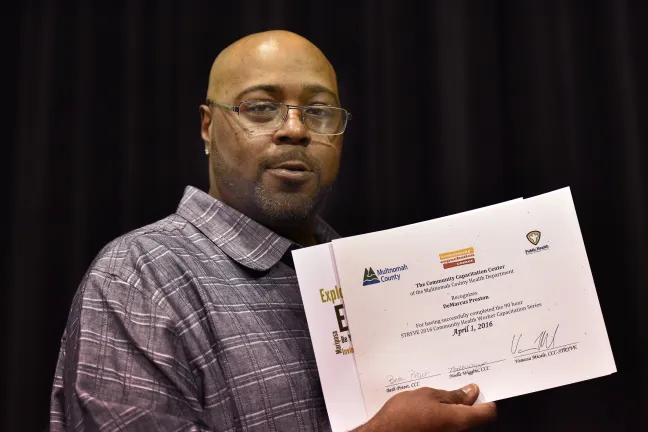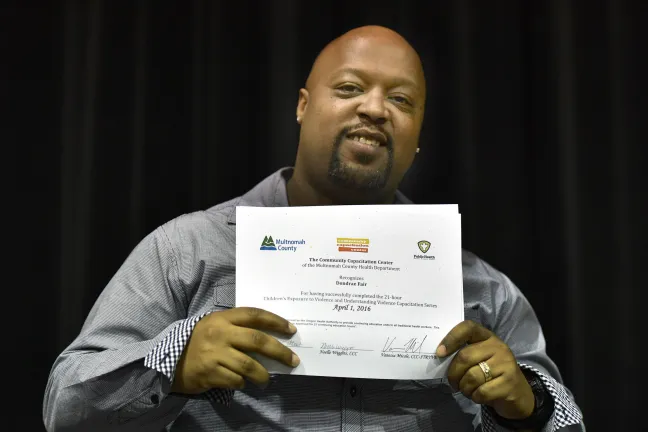They stretched across the stage. Youth mentors, domestic violence survivors, young mothers and fathers, recovering addicts, parent advocates, former gang leaders and aspiring doctors. People who'd grown up in Oregon’s small towns and the world’s biggest cities.
Most never would have met but for this six-week training to become certified community health workers. Their training was made intense by its emphasis on violence and the personal stories some students shared - stories of gang fights, sexual assault, domestic violence and war.
“The bond we established is really for the benefit of the community,” student Larry Summerfield, said Friday night during a ceremony honoring the 27 graduates. “Now you will be able to witness all the things we learned, see us go out in this community and effect change. And we’re not going to accept trying. We’re going to go out there and do.”
Community Health Workers come from, and serve, communities with the highest rates of health problems. Those are often low-income communities, communities of color and immigrant communities. Their lived experiences dealing with schools, government and physical and behavioral health systems make them highly credible and effective guides and problem-solvers.
Community health workers provide culturally-appropriate health education, offer informal counseling and help residents navigate the healthcare system and advocate for better care. Multnomah County’s Community Capacitation Center has trained more than 1,000 of these grass roots social workers since 1998 - and more than 300 since the state of Oregon implemented a certification program.
“Our mission is to support communities to address their own health issues,” said Noelle Wiggins who leads the Capacitation Center team. “People are the experts about their own experience.”
For some black communities in Portland, gang violence is one of the most pressing issues their young men face. That spurred the Capacitation Center and one of their programs called STRYVE (Striving to Reduce Youth Violence Everywhere) to develop a curriculum focusing on understanding violence.
“Many were serving the community already,” said Vanessa Micale, coordinator of STRYVE.
“Something that was especially powerful was that each participant told his or her story of what brought them to do this work,” she said. “It was profound. There were really powerful moments.”
It can be easier to share those stories with people who had also earned their bona fides through suffering.
In the 1980s, Demarcus “Chicken” Preston ran in a Portland gang. Police knew it, because they stopped him more than 70 times before he graduated high school; before he drove a car. It wasn’t until his 20s that he ran into real trouble. First it was minor traffic stops, then assault and later robbery.
He enlisted in the Army. He served a stint in prison. After he’d done his time, Preston decided to change his life. By then he had attended more than 20 funerals. All his childhood friends were dead.
He started working with younger gang members and attending court hearings - often when no one else was there to support them as they faced lengthy prison terms.
“Those kids go in, and they aren’t the same,” he said. “This is not a story on TV.” In 2014, Preston teamed up with the Community Cycling Center and launched a ride to bring rival and former gang members together in hopes of stemming the violence.
Preston hopes to one day open a foster home for at risk youth and a safe place for kids who want out of gangs. Meanwhile, his past is hard to shake. He had to fight to get custody of his own kids. And police continue to target him in traffic stops.
“They don’t keep paperwork on the good things you do,” he told the class. That was a Monday afternoon, after more than 100 hours spent with the same 26 people. It was the final week of class, when guest speakers came in to talk about how they could use their new skills.
“There were nine shootings in nine days. That’s real. And it’s not even 70 degrees yet,” said Antoinette Edwards, director of Portland’s Office of Youth Violence Prevention. “We need you. We need the voices of real people who do the real work.”
Two weeks before graduation, Preston’s classmate Dondrae “Choo” Fair pulled him aside.
“We got to go,” Fair said. Fair and Preston had known one another for years, since they both ran with the Bloods. They both still had family and friends mixed up in gangs.
And so Fair asked Preston to help him mediate a very personal affair: a family member - someone who wasn’t in a gang himself - had just had his face split open with a bottle for talking to a girl.
The young man would require two plastic surgeries to repair his face. And his friends wanted justice, even if justice ended in a prison sentence. Fair and Preston sat down to reason with the men.
“He don’t live the gang life,” Preston said about the young man who had been cut. “The police will handle this. The guy is going to go to jail. We can’t lose another brother.”
Their reasoning was met with skepticism and anger; but the men left unarmed. Fair got the call because they had know them his whole life. And that’s not the kind of knowledge you can learn at school.
“You can’t teach lived experience,” Fair said later. “You don’t want to go to prison, to get stabbed, get shot, to know what I know.”
For the past six years Fair has mentored gang-affiliated men who leave prison, first as a volunteer then as a paid peer mentor with Volunteers of America.
Fair helps Multnomah County’s parole and probation officers communicate with men who never had faith in the system. They might ask him which officer would be a good match for one of his clients. They call him when a man fails to report, or when a crisis hits.
“Anyone who has really worked with gang members knows what an asset he is,” said community justice manager Kate Desmond.
Last summer, four men, all on supervision, were involved in a shooting at Lloyd Center. Fair was tapped with convincing them to turn themselves in; it would look better for them and be safer for them, than remaining on the lam. And he’d be there for them in court; and he’d be there when they finished serving their time.
Together with a parole officer, Fair brought three of the men in. “That’s unheard of,” Desmond said.
When men are placed on supervision, Fair helps them find jobs and navigate a world that, for some, has changed drastically since they went away. His best friend, with whom he started his gang, is scheduled to be released from prison after 22 years. His cousin also gets out soon, after serving 19 years.
“They’re in for a shock,” he said. “The thing about prison is, you get out and the doors are still closed to you.”
Choo didn’t have a mentor when he got out of prison 20 years ago. But he met a woman who became his champion.
“I hustled. That was all I knew,” he said. “She told me I could do something different. I didn’t know I could do something different. I didn’t know I could do anything but deal drugs. It was her love. Her support.”
Fair grew up in inner northeast Portland, and he returned Friday night to celebrate with his 26 classmates in the auditorium of Self Enhancement Inc.
His fellow classmate Randal Wyatt performed with his band Speaker Minds. Fair sat with his wife and two of his five kids, enjoying plates of chicken, collard greens and cornbread. He laughed with friends, and cheered for each student who stood up to receive a certificate of completion.
And then his name was called.
What is the Capacitation Center?
The Multnomah County Health Department launched the Community Capacitation Center to support communities most affected by inequities.
“It’s about capacity building,” said the center’s director Noelle Wiggins. “We’re really here to support the community. Sometimes it might be bringing community organizations together with researchers to compete for a big federal grant. We’re trying to shift and balance power.”
The center works with community groups to develop and conduct health research, trains community health workers, and provides support to other organizations that employ community health workers. The center has also used that model to combat inequality in early childhood education. The center is training community members to work with families on how to advocate for their kids in school.


